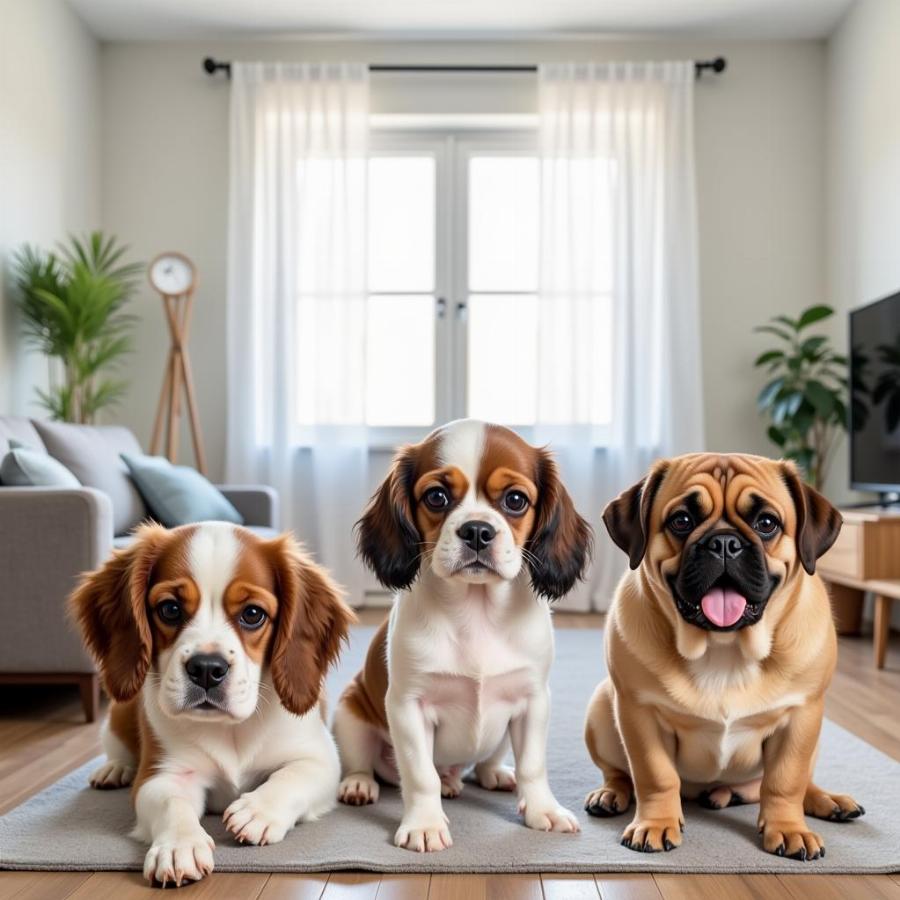Choosing a small, quiet dog breed can be the perfect solution for apartment living or for those who simply prefer a more tranquil home environment. These breeds are known for their lower energy levels and tendency to bark less, making them ideal companions for a variety of lifestyles. But with so many adorable small dog breeds out there, how do you find the perfect quiet companion for you? This guide will delve into everything you need to know about small quiet dog breeds, from personality traits and grooming needs to exercise requirements and training tips.
Understanding the Appeal of Small Quiet Dog Breeds
Many people are drawn to small quiet dog breeds for a variety of reasons. Apartment living often restricts noise levels, and a quiet dog can be a great fit for these close quarters. Similarly, individuals working from home might find a less vocal companion helps maintain focus and productivity. Senior citizens or those with a quieter lifestyle also often prefer a dog that matches their more relaxed pace. Beyond practical considerations, some people simply prefer the gentle companionship of a less boisterous pet.
 Small Quiet Dog Breeds Perfect for Apartment Living
Small Quiet Dog Breeds Perfect for Apartment Living
Top Small Quiet Dog Breeds to Consider
Let’s explore some of the most popular small quiet dog breeds:
- Cavalier King Charles Spaniel: These sweet-natured dogs are known for their gentle disposition and adaptability. They thrive on human companionship and are generally happy to cuddle up on the couch.
- French Bulldog: These playful and affectionate pups are relatively low-maintenance and don’t require excessive exercise. Their charming personalities and quiet nature make them excellent city dwellers.
- Shih Tzu: Originally bred as companion dogs, Shih Tzus are known for their loving and loyal personalities. They are relatively quiet and enjoy spending time with their families.
- Bichon Frise: These fluffy white dogs are known for their cheerful disposition and playful nature. While they enjoy a good romp, they are generally quiet and well-suited to apartment living.
Caring for Your Small Quiet Companion
While these breeds are known for being quiet, remember each dog is an individual. Early socialization and training are key to ensuring a well-behaved and well-adjusted companion. Positive reinforcement methods work best with these sensitive breeds.
What are the grooming needs of small quiet dog breeds?
Grooming needs vary depending on the breed. For instance, a Shih Tzu requires regular brushing to prevent mats, while a French Bulldog needs minimal grooming. Research your chosen breed’s specific grooming requirements.
How much exercise do small quiet dog breeds need?
Even small quiet dogs need regular exercise to stay healthy and happy. Short daily walks and playtime are usually sufficient.
Finding the Right Breed for You
Consider your lifestyle, living situation, and personal preferences when choosing a breed. Do you have allergies? Knee surgery for dogs can be costly, so choosing a breed with fewer predispositions to joint problems might be beneficial. Are you looking for a dog that enjoys cuddling on the couch, or one that’s up for a short hike? Research different breeds and talk to breeders or rescue organizations to find the perfect match.
Conclusion
Small quiet dog breeds can bring immense joy and companionship to our lives. By understanding their unique needs and characteristics, you can choose the perfect peaceful pup to enrich your home and heart. Remember to research thoroughly and prepare your home for your new furry friend. With the right match, you’ll have a loyal and loving companion for years to come. Consider celebrating National Spoil Your Dog Day with your new quiet companion.
FAQs
- Are all small dogs quiet? No, some small breeds are known for being quite vocal.
- Do small quiet dogs shed? Shedding varies by breed. Some shed minimally, while others require regular grooming.
- Are small quiet dogs good with children? Some are, while others prefer quieter households. Research individual breeds.
- Are small quiet dogs easy to train? Most are intelligent and eager to please, making training relatively easy with positive reinforcement.
- Where can I find a small quiet dog breed? Reputable breeders and rescue organizations are good places to start. Check if there are specific breeds in need during National Spoil Your Dog Day.
- What should I look for in a reputable breeder? A good breeder will prioritize the health and well-being of their dogs. They should be knowledgeable about the breed and willing to answer your questions.
- Are there health concerns specific to small quiet dog breeds? Some breeds are prone to certain health issues. Research potential health concerns before choosing a breed.
Other Questions to Consider
- What is the best food for small quiet dog breeds?
- How can I create a comfortable and enriching environment for my small quiet dog?
- What are some common behavioral issues in small quiet dog breeds and how can I address them? Perhaps a corner bed for dogs would create a safe space.
You might also be interested in learning about dog halloween costumes large breed, or what to do if your dog ate edibles.
Expert Insight:
- “Small quiet dogs can make fantastic companions for individuals living in apartments or those who prefer a calmer home environment,” says Dr. Emily Carter, DVM.
- “Early socialization is crucial for any dog, especially small quiet breeds, to ensure they develop into well-adjusted adults,” adds Certified Dog Trainer, Sarah Miller.
- “Remember to tailor your training methods to your dog’s individual personality and learning style,” advises renowned canine behaviorist, Dr. David Lee.
Beaut Dogs is your go-to resource for all things related to dog breeds, care, and companionship. We provide reliable, helpful, and in-depth information about the world of dogs. When you need assistance, please contact us at Email: [email protected] for detailed and accurate answers from Beaut Dogs. Visit us at https://beautdogs.com to explore the wonderful world of dogs and discover how to care for them in the best way possible.